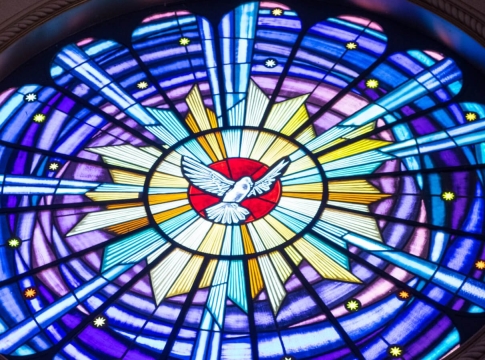
The Bible makes several references to the Holy Spirit, primarily in the New Testament. He is referred to by a number of titles, including “Holy Spirit” (Matthew 28:19), “Spirit of the Lord” (Isaiah 61:1), “Spirit of God” (Genesis 1:2, 1 Samuel 10:10), “Spirit of truth” (John 14:16–17), and “Spirit of Jesus” (Philippians 1:19). What is the role of this Holy Spirit, and who is he?
The Holy Spirit is God
Aside from God the Father and God the Son, there are three Persons in the triune God: the Holy Spirit. He is a completely divine Person, not merely an impersonal force.
Matthew 28:19–20 is one passage that demonstrates that the Holy Spirit is equally “God” as the Father and the Son. “Go therefore and make disciples of all nations, teaching them to observe all that I have commanded you, and baptizing them in the name of the Father, the Son, and the Holy Spirit.” Other scriptures demonstrate the Holy Spirit’s true divine nature:
- He is eternal (Hebrews 9:14)
- He is omnipresent (Psalm 139:7-10)
- Because of His omniscience, He is aware of everything (1 Corinthians 2:10–11).
- He is almighty (Luke 1:35-37)
- He is holy (Romans 1:4)
What is the work of the Holy Spirit?
Although they each have distinct functions, the Father, the Son, and the Holy Spirit are one God. They work closely with the other members to carry out these responsibilities.
It is evident that the Holy Spirit has been active throughout human history in a number of ways, including creation, the Son’s incarnation, human birth, Bible inspiration and illumination, and the transformation of Christians.
Was the Holy Spirit involved in creation?
The Bible begins with the clear statement that in the beginning, God created the heavens and the earth. The second verse makes clear that the Holy Spirit was actively involved in the process of creation: “And the Spirit of God was hovering over the face of the waters.” (Genesis 1:2) The Hebrew word for “spirit” as it is used here, can also be translated as “breath”. That is what most Bible translations do in Psalm 33:6, which reads:
“By the word of the Lord the heavens were made,
And by the breath of His mouth all their host.”
Another verse about the Holy Spirit’s creative power is Job 33:4,
“The Spirit of God has made me,
And the breath of the Almighty gives me life.” (compare Genesis 2:7)
So, although the Bible does not explain in detail what the Holy Spirit’s role in creation was, it is clear that He was actively involved.
What is the Holy Spirit’s role in the incarnation of Jesus?
God the Son was born from a virgin, Mary, when He took on human form. “The Holy Spirit will come upon you, and the power of the Most High will overshadow you,” the angel Gabriel said upon announcing his birth. “Therefore the child to be born will be called holy—the Son of God.” Luke 1:35 The Holy Spirit overshadowed Mary to make a baby in her womb while she was a virgin, just as He did when He hovered over the face of the waters at creation.
The Holy Spirit gives spiritual life
To know and love God and to live a life that honors Him is the ultimate human objective. However, because of their sinfulness, humans are no longer able to achieve this aim. They have died spiritually (Ephesians 2:1–3). Reviving individuals spiritually is the job of the Holy Spirit.
The term “the new birth” or “being born again” refers to a metaphorical turning moment that marks one’s conversion to Christianity. As Jesus says, “Truly, truly, I say to you, unless one is born of water and the Spirit, he cannot enter the kingdom of God,” the Holy Spirit plays a crucial part in that process. What is born of the Spirit is spirit, and what is born of the flesh is flesh. It is not surprising that I told you that you needed to be born again. You can hear the wind blowing anywhere it pleases, but you have no idea where it is coming from or going. According to John 3:5-8, “so it is with every individual born of the Spirit.”
People are convinced of their sins by the Holy Spirit, who also directs them to the atoning death of Jesus. The Spirit bears witness that those who come to faith and accept God’s forgiveness are declared children of God and have been granted eternal life (Romans 8:16).
The Spirit transforms believers
Despite being God, the Holy Spirit resides in the hearts of all who accept Jesus as their Savior. For illustration, consider Romans 8:9, which states, “If the Spirit of God truly resides in you, then you are not in the flesh but rather in the Spirit.” He does not belong to anyone who does not possess the Spirit of Christ.
“May the God of our Lord Jesus Christ, the Father of glory, give you the Spirit of wisdom and of revelation in the knowledge of him, having the eyes of your hearts enlightened” (Ephesians 1:17–18) is how the Spirit teaches believers the truth of God’s Word while residing within them.
Purification and sanctification result from the Holy Spirit’s indwelling, which means that when believers’ faith deepens, the power of sin is broken. God’s work in a person’s life is demonstrated by the fruit of the Spirit. According to Galatians 5:22–23, “the fruit of the Spirit is love, joy, peace, patience, kindness, goodness, faithfulness, gentleness, and self-control.”
The Holy Spirit will raise our bodies from the dead
“If the Spirit of him who raised Christ Jesus from the dead dwells in you, he who raised Christ Jesus from the dead will also give life to your mortal bodies through his Spirit who dwells in you,” the scripture states. In addition to making people spiritually alive, the Spirit will also raise their bodies. (Romans 8:11)
The Holy Spirit and the church
The apostles were tasked with evangelizing when Jesus rose from the dead and ascended into heaven. However, this was only possible when they received the Holy Spirit’s empowerment at Pentecost. Even now, believers are changed by the Holy Spirit into witnesses of their faith, helping the Gospel to be shared all across the world.
In churches, the Holy Spirit is also at work. He gathers them and keeps them safe. However, He also cleanses the church, making her holy, innocent, and above reproach in God’s eyes in the end (Colossians 1:22). The Holy Spirit is centered on the majesty of Jesus in all of this, not on himself (see John 16:13–14).
What are the gifts of the Holy Spirit?
The Holy Spirit bestows various talents to Believers; the Bible lists them. “The utterance of wisdom,… the utterance of knowledge,… faith,… gifts of healing,… the working of miracles,… prophecy,… the ability to distinguish between spirits,… various kinds of tongues,… the interpretation of tongues” is a list provided by the apostle Paul. 12:8–10 in 1 Corinthians While different gifts are given for different purposes, not every person receives them all (1 Corinthians 12:4–12:7).





